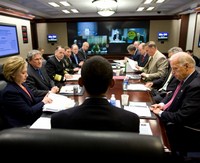Critics of U.S. foreign policy often argue that the United States lacks a grand strategy -- a set of principles, norms and goals applied consistently to foreign policy. Many have argued, for example, that Washington's reluctance to take strong action to help overthrow Syrian dictator Bashar Assad, or its failure to support protesters in places like Bahrain, results from a grand strategy deficit. In fact, the critics have it wrong in this age-old debate. What Washington needs, whether under a Democratic or a Republican administration, is actually less grand strategic thinking.
Political pundits and scholars alike love to talk about grand strategy as if it were an aristocratic sport. Scholars often interpret how major states behave in terms of two basic grand strategies: “balance of power” strategy, which requires action chiefly to prevent any one country from becoming too strong and which largely ignores moral considerations; or “hegemonic” strategy, which calls for dominating others as a means of creating stability either regionally or globally. Washington, the argument often runs, should embrace one or the other of these grand strategies, or else formulate some other type of approach. Advocates appear to believe that a grand strategy, whatever it is, can help organize America's foreign policy, allow it to plan and prioritize, link its means and ends, deter or dragoon its enemies and enhance U.S. credibility.
Perhaps grand strategy can accomplish some of these goals sometimes, and all foreign policy has some grand strategic characteristics. But thinking in strictly grand strategic terms is no longer the best approach for U.S. foreign policy in a complex, globalizing world whose power structure is unlike that of previous centuries, when just a handful states dominated global affairs.

